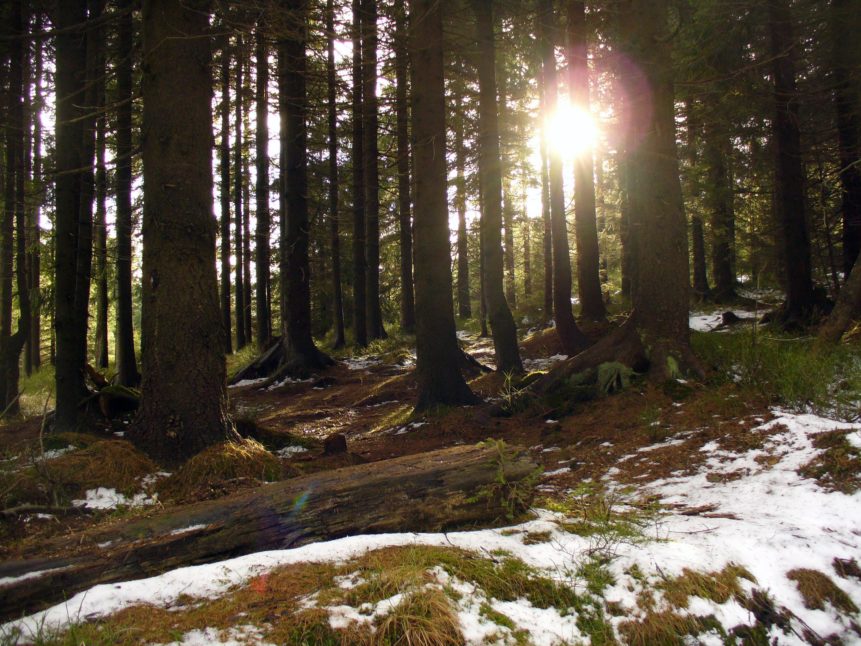
When I was little, my grandmother would tell anyone who would listen to “slow down and smell the roses.” It turns out this is great advice. In fact, in the 1980s, doctors and health experts in Japan started recommending frequent ‘forest baths’ as an essential part of preventative healthcare. These are not the kind of baths you take in a claw-footed tub with hot water and bubbles—a forest bath is a guided, meditative nature walk that claims it can cleanse mind, soul, and spirit.
Shinrin-yoku is a Japanese term that means “taking in the forest atmosphere” or “forest bathing.” The idea is to take people out of urban environments jam-packed with the stress of city life and immerse them in a natural environment. A forest bath is simply a slow nature walk with frequent pauses to meditate and open the senses to the surrounding sights, sounds, and smells. It is about fully experiencing the journey of the walk, not about achieving a specific pace, distance, or destination.
Forest bathing combats two realities of modern life that pose a health risk for most Americans today: living indoors and sitting. According to the Environmental Protection Agency (EPA), the average American spends 93% of their life indoors: 87% strictly indoors and another 6% in automobiles. That’s only 7% of our entire lives outdoors, or half a day per week. Plus, most indoor life is spent sitting down. James A. Levine, M.D., Ph.D. explains the risks of sitting on the Mayo Clinic website: “Research has linked sitting for long periods of time with a number of health concerns, including obesity and metabolic syndrome — a cluster of conditions that includes increased blood pressure, high blood sugar, excess body fat around the waist, and abnormal cholesterol levels. Too much sitting also seems to increase the risk of death from cardiovascular disease and cancer.”
Westerners are now discovering the work of Japanese and South Korean researchers who have been studying the significant health benefits of spending time on your feet and outdoors for over two decades. The Shinrin-yoku website explains that although humans have always intuitively felt being out in nature was good for us, now there are scientific studies demonstrating many of the healing effects of simply being in wild and natural areas. The website expands on one of the benefits, explaining, “Many trees give off organic compounds that support “NK” (natural killer) cells that are part of our immune system’s way of fighting cancer.”
According to the Shinrin-yoku website, some of the scientifically-backed potential health benefits of forest bathing include boosted immune system functioning, reduced blood pressure, reduced stress, improved mood, increased ability to focus, accelerated recovery, increased energy levels, and improved sleep.
In a recent Washington Post article, certified forest therapy guide Ben Paige, who founded Shinrin-yoku Los Angeles, stated, “I think about where yoga was 30 years ago and where it is today, and I realize that forest therapy is making the same journey toward cultural definition in a way that will mainstream the practice.” Paige’s Sonoma County, CA walks are so popular that they have a waiting list.
Forest bathing requires a significant time investment. Most walks are between one and three hours in length. The walks are deliberate and slow-paced, making them appropriate for all ages. Unlike other hikes or nature walks, the guide will ask the group to stop along the way and take time to listen, look, hear, and feel different aspects of the surroundings. The guide will provide meditations to help group members breathe deeper and be completely present in nature, helping to evaporate worries and clear the concerns that often accompany life in our turbo speed society.
When asked about forest bathing, spa director Catherine Powers at L’Auberge de Sedona in Arizona expressed that “Tree-bonding might sound hokey, but it sure beats car honking on the 405.” In fact, “It can be magical for people from urban environments.” As more wellness research reveals the therapeutic power of this practice, it is easy to see why forest bathing is rapidly becoming one of the most popular trends on the world health horizon.


